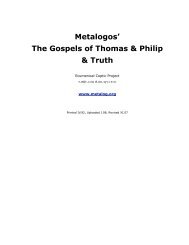Andrew Louth - Syriac Christian Church
Andrew Louth - Syriac Christian Church
Andrew Louth - Syriac Christian Church
Create successful ePaper yourself
Turn your PDF publications into a flip-book with our unique Google optimized e-Paper software.
30 INTRODUCTION<br />
union, and also sees a circular movement of procession, return and<br />
rest in the ultimate that is of clear Neoplatonic inspiration. He also<br />
applies to the liturgy the Neoplatonic language of theurgy, and in<br />
doing so transforms it. 30<br />
But perhaps the most compelling aspect of Denys’ vision is his<br />
understanding of the cosmos. He sees it as a hierarchy, or hierarchy of<br />
hierarchies. The word, hierarchy, is Denys’ own coinage and it<br />
is important to realize what he meant by it. It has come to mean<br />
nowadays a rigid order of graded subordination. But in his Celestial<br />
Hierarchy, Denys defined it quite differently:<br />
In my opinion a hierarchy is a sacred order, a state of<br />
understanding and an activity approximating as closely as<br />
possible to the divine… The goal of a hierarchy, then, is to enable<br />
beings to be as like as possible to God and to be at one with him…<br />
Hierarchy causes its members to be images of God in all<br />
respects, to be clear and spotless mirrors reflecting the glow of<br />
primordial light and indeed of God himself. It ensures that when<br />
its members have received this full and divine splendour they<br />
can then pass on this light generously and in accordance with<br />
God’s will to beings further down the scale. (3.1f.:164D–165A) 31<br />
What Denys means by hierarchy, then, is a radiant display that<br />
reaches out from God throughout the whole of the created order and<br />
draws it back into union with him. Whereas the modern understanding<br />
of hierarchy stresses separation and exclusion, for Denys it connotes<br />
inclusion and union. 32 He sees the cosmos, not in traditional classical<br />
terms as the spheres of the planets, the sun and the moon, and beyond<br />
them the fixed sphere of the stars—for him, as for most <strong>Christian</strong>s,<br />
lifeless beings—but as rank on rank of angelic beings, praising God<br />
and radiating his glory, and drawing human beings up into praise of<br />
God and the transforming power of his glory. This gives <strong>Christian</strong><br />
worship, and the <strong>Christian</strong> message, a cosmic dimension. Just as the<br />
Greek Fathers see the Fall of man in ontological terms—the lettingloose<br />
of corruption and death driving the whole created order towards<br />
non-being—so they see the coming of the reconciling Christ and our<br />
attempts to respond to, and live out, that reconciliation in our lives as<br />
of cosmic significance. The Dionysian vision of the cosmos provides a<br />
metaphysical context in which the cosmic significance of the <strong>Christian</strong><br />
Gospel can be made clear.<br />
Maximus is heir to all this: but, more than that, in his own<br />
theological reflection he works out in greater—and more practical—<br />
detail what in Denys is often not much more than splendid and<br />
inspiring rhetoric. How the cosmos has been fractured, and how it is




